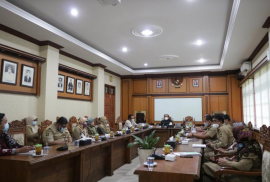Tuesday (23/3) PIAT UGM planted the Inpari 42 Agritan GSR paddy variety in block 1, Kalitirto garden, with a planting area of 9,500 meters2. This variety is irrigated lowland paddy which was launched by the Research and Development Agency of the Ministry of Agriculture in 2016. The choice of Inpari 42 Agritan GSR is because it can have productive tillers as many as 18 panicles/clump with a potential yield of 7.10 tons/hectare. Although susceptible to tungro virus, the Inpari 42 Agritan GSR variety is resistant to leaf blast disease and is resistant to brown planthopper pests. This Inpari 42 Agritan GSR paddy variety also has a slightly shorter planting life than the Pepe variety, which was harvested on 17 March, which is a maximum of 112 days.
March
Wednesday (17/3) PIAT UGM harvested the Pepe variety, which is included in the commodity of irrigated paddy fields. Harvesting is carried out on an area of 9000 m2 located in block 1 of the Berbah garden, with a production of approximately 6 tons. Pepe paddy has a planting age of 120-128 days, with a maximum plant height of 110 cm, and has a potential yield of 7-8 tons / hectare. Another advantage of pepe paddy is that it is resistant to brown planthopper, biotype 2, and is resistant to bacterial leaf blight strain III.
Monday (15/03/21) The Center for Agrotechnology Innovation (PIAT UGM) held an discussion with the Kulon Progo Regency Government (Pemkab) regarding waste management at the Bogowonto and the Progo River, in the Menoreh room of the Kulon Progo Regency complex. On this occasion, PIAT UGM was represented by Chandra Wahyu Purnomo, S.T., M.Eng., D.Eng as the Secretary of PIAT.
When entering the discussion session, he said that waste is an environmental problem that has always been a concern of PIAT UGM. In Kulon Progo Regency itself, waste problems are found along the coast, one of which is around the mouth of the Progo River where the condition of the garbage piles is quite apprehensive. PIAT intends to submit a proposal for e-ASIA JRP Cooperation between Japan and the Philippines related to the theme “Prevention of Pollution in the Sea” to overcome this problem.



